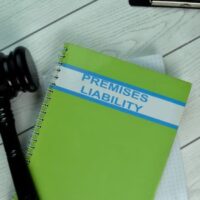Business Establishment Premises Liability for Slips and Falls in Florida

Slip and fall accidents can happen anywhere, but when they occur in a business establishment in Florida, the legal implications are specifically governed by Florida Statute §768.0755. This law sets forth the criteria under which a business can be held liable for injuries caused by transitory foreign substances.
Florida Statute §768.0755 addresses premises liability for transitory foreign substances in a business establishment. Under this law, if a person slips and falls due to a substance on the floor, proving the business’s liability involves demonstrating that the establishment had knowledge—either actual or constructive—of the dangerous condition and failed to take appropriate action to address it.
A “transitory foreign substance” refers to any temporary, unnatural, or unexpected substance on a surface that can cause a slip, trip, or fall. This term is commonly used in premises liability law, especially in discussions around slip and fall accidents. Examples of transitory foreign substances can include liquids like water or oil, solid items like food or debris, or any other substance that isn’t normally present and could create a hazardous condition on a floor, walkway, or other surfaces. The presence of these substances can lead to injury if they are not promptly identified and removed by the property owners managers or employees.
Actual knowledge means that the business was directly aware of the dangerous condition at the time of the accident. On the other hand, constructive knowledge can be established through circumstantial evidence. This evidence might include showing that the condition had existed for a length of time sufficient for the business to have discovered it through the exercise of ordinary care. Additionally, it might involve demonstrating that the condition was a regular occurrence, thus making it foreseeable. These factors help to establish whether the business could reasonably be expected to have known about the hazard and taken steps to mitigate it.
This statute shifts a significant burden of proof to the plaintiff, who must provide evidence that the business should have known about the hazard and should have acted to prevent it.
Legal Implications and Proof of Constructive Knowledge
The requirement to prove constructive knowledge under Florida Statute §768.0755 adds a layer of complexity to slip and fall cases. Plaintiffs must gather sufficient evidence to show that the business had an opportunity to address the hazard before the accident occurred. This might involve:
- Security camera footage showing how long the substance was on the floor before the incident.
- Incident reports or maintenance records indicating a recurring problem in the area where the fall occurred.
- Witness statements or depositions describing the scene or previous similar incidents at the location.
- Evidence that the condition of the substance itself indicates that the substance was present for such a length of time when injury occurred that had the business been exercising reasonable care they would have identified the substance.
Case Studies: Applications of Statute §768.0755
Consider a case where a customer in a grocery store slips on spilled juice that had been on the floor for several hours. If surveillance videos corroborate the time frame and show that employees passed by the area multiple times without addressing the spill, the store could likely be found to have constructive knowledge of the hazard.
Conversely, if a spill occurred moments before a fall and the business did not have reasonable time to react, establishing liability under this statute could be much more challenging for the plaintiff.
Contact Smith, Ball, Báez & Prather
Florida’s Statute §768.0755 sets a clear framework for understanding liability in slip-and-fall cases on business premises. For those injured in such incidents, it’s essential to collect as much evidence as possible to prove constructive knowledge. If you’ve been involved in a slip-and-fall accident, contact Smith, Ball, Báez & Prather for a free consultation. Our experienced attorneys are ready to ensure that your legal rights are protected.
Source:
leg.state.fl.us/Statutes/index.cfm?App_mode=Display_Statute&URL=0700-0799/0768/Sections/0768.0755.html
